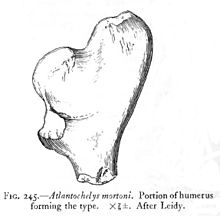User:Augustios Paleo/sandbox2
You can help expand this article with text translated from the corresponding article in French. (April 2016) Click [show] for important translation instructions.
|
| Augustios Paleo/sandbox2 Temporal range: Late Cretaceous,
| |
|---|---|

| |
| Fossil humerus | |
| Scientific classification | |
| Domain: | Eukaryota |
| Kingdom: | Animalia |
| Phylum: | Chordata |
| Class: | Reptilia |
| Order: | Testudines |
| Suborder: | Cryptodira |
| Family: | †Protostegidae |
| Genus: | †Atlantochelys Leidy, 1865 |
| Species: | †A. mortoni
|
| Binomial name | |
| †Atlantochelys mortoni Leidy, 1865
| |

Atlantochelys is an extinct genus of sea turtle from the Upper Cretaceous of New Jersey. For 163 years, only a partial humerus was known, but the second part of the same bone was found in 2012.[1][2][3] The full size has been extrapolated as being 3 m (9.8 ft).[4]
In the early 1800s, a proximal end of a turtle humerus was unearthed from Campanian-aged sediments of the Mount Laurel Formation in Monmouth County, New Jersey. The first mention of the specimen in literature comes from 1834 when Samuel George Morton wrote that there were several fossils that he referred to a large species of Testudo. The fossils may have been in the collection of the American Philosophical Society prior to being deposited in the Academy of Natural Sciences and were thought to have been discovered in the Cretaceous-aged layers of Burlington County, New Jersey.
Later in an 1865 publication, paleontologist Joseph Leidy referred the proximal humerus to Mosasaurus mitchelli based on the bone’s thin shaft and enlarged proximal head. Leidy hypothesized that M. mitchelli was a smaller species of the genus and had a larger counterpart in M. hoffmanii. Leidy’s assessment was not supported by other authors, who too classified Atlantochelys as a genus of turtle. Edward Drinker Cope
References
[edit]- ^ Parris, D., Schein, J., Daeschler, E., Gilmore, E., Poole, J., Pellegrini, R. Two halves make a holotype: two hundred years between discoveries. Proceedings of the Academy of Natural Sciences of Philadelphia. 163. ISSN 0097-3157.
- ^ "Paleontologists assemble giant turtle bone from fossil discoveries made centuries apart".
- ^ "Monster turtle fossils re-united". BBC News. 25 March 2014.
- ^ Parry, Wynne (March 25, 2014). "Missing Half of Bone Reveals Prehistoric Sea Giant". LiveScience. Retrieved December 23, 2018.
